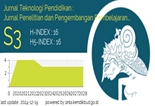Pengembangan Podcast dengan Model Addie pada Materi Cerita Rakyat Sebagai Sumber Belajar Berbasis Audio
Abstract
This study aims to produce a podcast as an audio-based learning resource and determine its feasibility. This research was conducted using the ADDIE development model (Analysis, Design, Development, Implementation, Evaluation) on folklore material. In this study, data were collected through observation and interviews, questionnaires and tests, which were then analyzed by paired two-sample t-test. The results of the content expert's review stated that the podcast developed was appropriate. The results of the expert review of audio-based learning resources stated that it was very good, while the review of learning design experts stated that the podcast developed was in the good category. Student responses in field trials showed student responses to the product were very good, which was 92.11%. The results of the calculation of student achievement before and after using interactive multimedia based on the results of the t-test carried out gave the results of t-count = 0.001 (<a = 00.5). The average result of the posttest of students is 86.92, which is above the KKM value set at 75. This shows that the development of podcasts as an audio-based learning resource is feasible to use in the learning process for folklore material.
Keywords
Full Text:
PDF (BAHASA INDONESIA)References
Bolliger, Supawan & Christine. (2010). Impact of Podcasting on Student Motivation in The Online Learning Environment. Computers Education. 55: 714 – 722.
Borg & Gall, 2003. Education Research New York : Allyn and Baco
Copley, Jonathan. (2007). Audio and video podcast of lectures for campus-based student: production and evaluation of student use. Innovation in Education and Teaching International, 44 (4): 387 – 399
Fadilah, Efi., dkk. (2017). Podcast sebagai Alternatif Distribusi Konten Audio. Kajian Jurnalisme, Vol. 1 No. 1. Diakses: http://jurnal.unpad.ac.id/kajianjurnalisme/article/view/10562
Mustika, R. (2016). Media Pembelajaran Sistem Audio untuk Pemberdayaan Pendidikan di Komunitas masyarakat. Masyarakat Telematika Dan Informasi: Jurnal Penelitian Teknologi Informasi dan Komunikasi, 6 (1) , pp.57-68. https://mti.kominfo. go.id/index.php/mti/article/view/75/63
Roll, A., dkk (2019). Pengembangan Sumber Pembelajaran Audio Berbasis Podcast Pada Materi Sejarah Lokal Di Sumatera Selatan. Diakses: file:///C:/Users/ASUS/Downloads/21017-49653-1-PB.pdf
Ratminingsih, N.M. (2016). Efektivitas media audio pembelajaran bahasa Inggris berbasis lagu kreasi di kelas lima sekolah dasar. JPI (Jurnal Pendidikan Indonesia), 5(1), pp.27-38. DOI: http://dx.doi. org/10.23887/jpi-undiksha.v5i1.8292
Sugiyono (2017). Metode Penelitian Kuantitatif.Yogyakarta: Alfabeta
Wicaksono, Andi. (2017). Media Audio dalam meningkatkan kualitas proses pembelajaran apresiasi cerita pendek. Jurnal Shahih, Vol 2 No 1, Januari-Juni 2017, hal: 67-78. DOI : 10.22515/ shahih.v2i1.670
DOI: https://doi.org/10.33394/jtp.v6i2.3887
Refbacks
- There are currently no refbacks.
Copyright (c) 2022 Zam Zam Jamaludin, Erwin Rahayu Saputra

This work is licensed under a Creative Commons Attribution-ShareAlike 4.0 International License.
This Journal has been Indexed by:
Jurnal Teknologi Pendidikan
ISSN: 2656-1417 (Online)
ISSN: 2503-0620 (Print)
Published by Program Studi Teknologi Pendidikan, FIPP
Universitas Pendidikan Mandalika
Email: [email protected]

This work is licensed under a Creative Commons Attribution-ShareAlike 4.0 International License.















.png)







